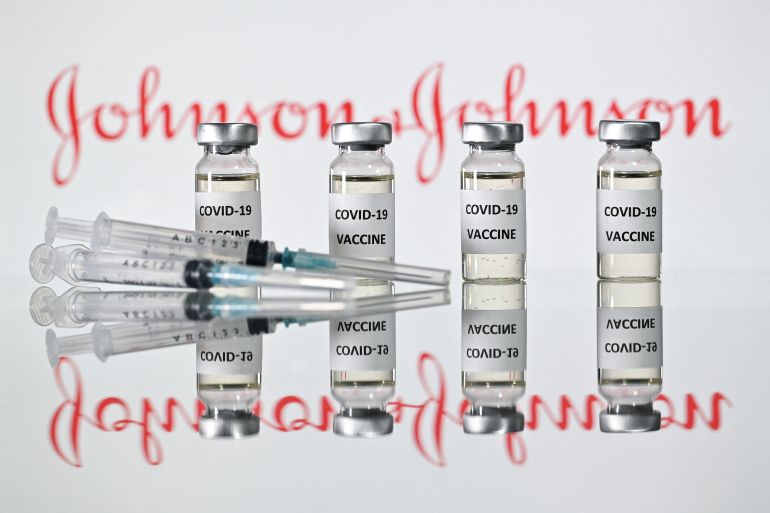South Africa suspends Johnson & Johnson vaccine rollout
‘We cannot take the decision by the FDA lightly,’ South Africa’s Health Minister Zweli Mkhize says.

South Africa has suspended the rollout of Johnson & Johnson’s COVID-19 vaccine after US federal health agencies recommended pausing its use because of rare cases of blood clots in combination with low platelet counts.
Six women under 50 developed rare blood clots in the United States among more than six million people given the J&J shot so far.
Keep reading
list of 3 itemsVaccine shortages hit poor countries as global deliveries stall
What do we know about the AstraZeneca vaccine and blood clots?
“I held urgent consultations with our scientists, who have advised that we cannot take the decision by the FDA lightly,” South Africa’s Health Minister Zweli Mkhize told reporters.
“We have determined to voluntarily suspend our rollout until the causal relationship between the development of clots and the Johnson & Johnson vaccine is sufficiently interrogated,” Mkhize added, saying there had been no reports of blood clots in South Africa after roughly 290,000 vaccinations.
The US Food and Drug Administration (FDA) said the pause there was expected to be a matter of days.
Mkhize said South Africa’s COVID-19 vaccine deals with Johnson & Johnson (J&J) and Pfizer have non-refundability clauses, meaning down payments will not be returned under any circumstances.
“This is another onerous term that we have had to settle for,” Mkhize said during a virtual meeting with a parliamentary committee on Wednesday. He added that South Africa was paying $10 per dose for the J&J and Pfizer vaccines.
The European Commission, meanwhile, said it was seeking clarification from Johnson & Johnson about the company’s “completely unexpected” announcement of delays in vaccine deliveries to the European Union.
EU regulators had said last week they were reviewing the vaccine following the reports of blood clots but had not stopped the planned rollouts, which were expected to begin at the end of the month.
Canada said it was talking to Johnson & Johnson about the clotting reports. Separately, Belgium announced it will continue vaccinations with the J&J jab for the time being, while the Dutch medicines regulator said the benefits of the vaccine outweigh the possible risks.
US vaccine rollout
The announcement on Tuesday represents another setback for J&J, following a discovery last month that workers at a Baltimore factory had unintentionally contaminated some vaccines, forcing the company to throw out 13 to 15 million doses.
The wrinkle also comes amid what had been a relatively smooth coronavirus vaccine rollout programme in the US, which has relied heavily on vaccines developed and manufactured by Moderna and Pfizer-BioNTech.
Biden has set an April 19 deadline for all US adults to be eligible for the vaccine.
Following the announcement, White House COVID-19 Response Coordinator Jeff Zients said the pause “will not have a significant impact on our vaccination plan”.
In a statement, Zients said the Johnson & Johnson vaccine “makes up less than 5 percent of the recorded shots in arms in the United States to date”, adding that the US has secured enough Pfizer-BioNTech and Moderna doses to inoculate 300 million Americans.
Still, the single-dose Johnson & Johnson vaccine is more durable than those produced by Moderna and Pfizer-BioNTech, making it advantageous for reaching remote areas in the US that do not have access to deep cold storage. It is also expected to be a useful tool in the worldwide vaccination effort.
Public health experts have also expressed concern that the health authorities’ recommended pause could further discourage those resistant to being vaccinated.
The Centers for Disease Control’s Advisory Committee on Immunization Practices will meet on Wednesday to discuss the cases and the FDA has also launched an investigation.
More than 6.8 million doses of the J&J vaccine have been administered in the US.
Today FDA and @CDCgov issued a statement regarding the Johnson & Johnson #COVID19 vaccine. We are recommending a pause in the use of this vaccine out of an abundance of caution.
— U.S. FDA (@US_FDA) April 13, 2021
Delivery to Europe
During the press conference on Tuesday, the FDA’s Marks said the combination of the blood clots and reduced platelet counts “is very, very similar to what was seen in Europe” with the Oxford-AstraZeneca vaccine.
Both vaccines use similar technology – a modified and harmless adenovirus – to inoculate recipients.
A small number of reported blood clots led several countries, predominantly in Europe, to intermittently pause the use of the Oxford-AstraZeneca vaccine last month. Most have since resumed its use, with some only administering it to the elderly, who are most at risk of contracting the coronavirus.
On April 7, the European Medicines Agency (EMA) concluded that the clots and low platelet count were likely an extremely rare side effect of the vaccine, but argued the benefits far outweighed the small risk. The World Health Organization had previously made a similar determination.
Marks said the current hypothesis is that the Johnson & Johnson vaccine, like Oxford-AstraZeneca, is creating a similar immune response that causes adverse conditions.
On Tuesday, Johnson & Johnson also announced it was delaying the rollout of its coronavirus vaccine in Europe, just a day after it began delivering to the continent. It had committed to delivering 55 million doses to the bloc by the end of June and another 120 million in the third quarter.
“We have been reviewing these cases with European health authorities,” the company said. “We have made the decision to proactively delay the rollout of our vaccine in Europe.”